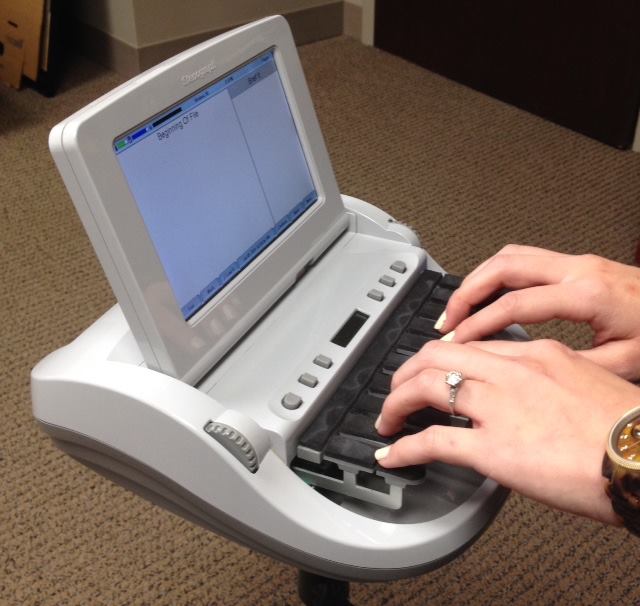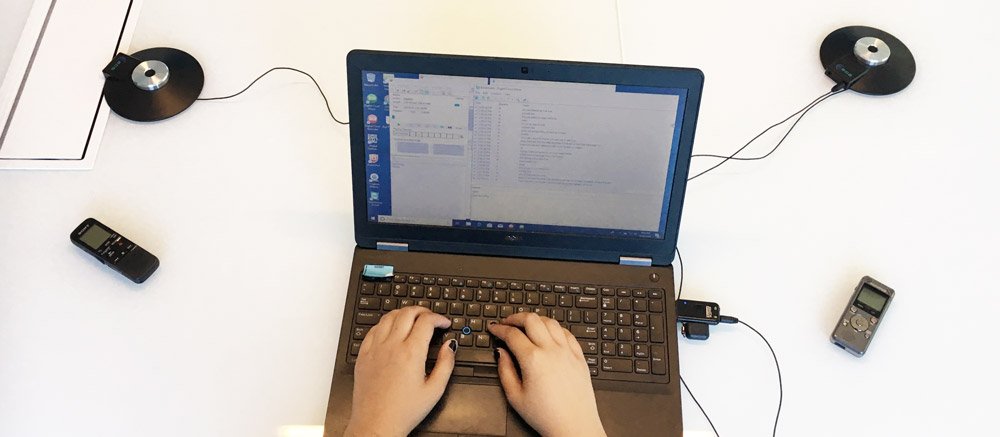Everything That Goes Into durham reporting From Courtroom to Final Transcript
Everything That Goes Into durham reporting From Courtroom to Final Transcript
Blog Article
Comprehending Just How Court Coverage Functions: A Trick Element in the Justice System
Court coverage plays a necessary function in the legal system. It guarantees that all court proceedings are recorded precisely. Stenotype reporter utilize specialized devices and techniques to create verbatim records. These records serve numerous purposes, consisting of allures and lawful clarity. Understanding the ins and outs of court coverage discloses its importance in preserving the integrity of justice. What obstacles do court press reporters encounter in this evolving field?
The Function of Court Reporters in the Legal System
Stenotype reporter play a necessary duty in the lawful system, guaranteeing exact and reliable paperwork of court process. They are in charge of recording every talked word throughout trials, hearings, and depositions, developing a verbatim records that acts as a permanent record. This documentation is essential for allures, providing a structure for greater courts to review cases.In enhancement to recording spoken language, stenotype reporter additionally promote communication in between attorneys, courts, and various other events associated with lawful issues. Their job promotes openness and liability within the judicial process.Utilizing specialized tools and software, stenotype reporter must remain concentrated and attentive, commonly working under stress to satisfy limited deadlines. Their transcripts are not only necessary for legal reference yet also for maintaining the honesty of judicial process. Ultimately, stenotype reporter add considerably to the reasonable management of justice, guaranteeing that all voices are heard and tape-recorded accurately.
Essential Abilities Needed for Court Reporting
Court reporting needs a distinct set of skills that are crucial for precision and effectiveness. Proficiency of stenography methods, strong listening and understanding capabilities, and thorough interest to information are vital for success in this area. These abilities enable stenotype reporter to produce reputable transcripts that work as essential records in the lawful system.
Proficiency of Stenography Techniques
While grasping stenography strategies is essential for aspiring court reporters, it needs commitment and practice to create the essential abilities. Stenography entails making use of a specialized key-board to catch talked words in real time, making accuracy and rate crucial. Court press reporters need to discover to utilize shorthand icons and establish muscle memory to ensure effective transcription. Regular exercise with dictation workouts assists in enhancing typing rate, while familiarity with legal terms enhances comprehension during proceedings. Comprehending the phonetic framework of the English language is significant, as it aids in precisely catching discussion. Eventually, proficiency in stenography not just facilitates effective communication within the court but also maintains the honesty of the lawful procedure.
Strong Paying Attention and Comprehension
Reliable court reporting joints not just on stenography skills but likewise on solid listening and understanding capabilities. Court press reporters need to proactively listen to statements, lawful debates, and discussions, assuring they understand the subtleties of spoken language. This skill helps with accurate transcription of complicated lawful procedures, where every word issues. Understanding expands beyond surface-level understanding; press reporters should translate context, tone, and intent to catch the significance of conversations precisely. Additionally, they typically run into specialized terms and jargon, needing fast adaptation and retention of information. The capability to manufacture what is heard while concurrently transcribing is crucial, as it assures the stability of the official record. Strong listening and comprehension are important in providing specific and trustworthy court records.
Interest to Information
Attention to detail is an essential skill for stenotype reporter, matching their listening and understanding capacities. This precision assures that every spoken word, inflection, and subtlety is captured properly in transcripts. Court press reporters must thoroughly keep in mind lawful terminology, names, and complicated dialogue to supply trustworthy documents for lawful procedures. A minor oversight can bring about substantial effects, potentially influencing situation results (durham reporting). In addition, court reporters frequently work under stress, needing them to maintain emphasis and accuracy in fast-paced environments. Their interest to information not just enhances the honesty of the judicial process however also promotes trust fund amongst lawful experts. Eventually, this skill is vital for creating transcripts that function as clear-cut documents in litigation, guaranteeing justice is supported
The Technology Behind Court Reporting
As court coverage progresses, the innovation made use of by experts in the field has ended up being significantly sophisticated. Conventional shorthand writing has largely been supplemented by advanced electronic tools that boost speed and precision. Stenographic equipments, outfitted with specialized software, permit court reporters to record spoken words in real-time, equating them into text instantaneously. This innovation not just speeds up the transcription procedure however also lessens the possibility for errors.Moreover, voice recognition software application is becoming a useful property, enabling computerized transcription from audio recordings. This innovation gives a choice for developing transcripts when a human press reporter may not be offered. Furthermore, cloud-based storage services assist in simple accessibility and sharing of transcripts among lawful specialists, guaranteeing that crucial information is easily available. As these innovations proceed to advance, they play a crucial function in preserving the integrity and performance of the justice system, ultimately sustaining the crucial work of stenotype reporter.
The Process of Recording Legal Procedures
The process of transcribing legal proceedings needs a blend of ability and innovation to ascertain precision and performance. Stenotype reporter use specialized devices, such as stenographic devices, to record spoken words in real-time. This modern technology enables the reporter to transform discussion into text, assuring that every statement made throughout a trial or hearing is documented.Once the session ends, the first transcripts undergo editing for clearness and coherence. Press reporters may likewise integrate audio recordings to cross-reference and validate the precision of their transcriptions. This precise process guarantees that the last record shows a precise account of the proceedings.Additionally, stenotype reporter have to keep a detailed understanding of legal terms and court procedures to properly equate talked language into written form. Their competence not just help in producing trusted documents but also sustains the lawful system by providing crucial documentation for appeals and future referrals.
Guaranteeing Accuracy and Honesty in Court Records
Making sure accuracy and stability in court records is extremely important for the judicial process. Stenotype reporter play a vital function in capturing process properly, while developments in modern technology improve their capability to maintain high criteria. Furthermore, promoting privacy standards is important to secure sensitive information within legal papers.
Duty of Court Reporters
Stenotype reporter play an important role in the judicial system by recording accurate why not try here and verbatim accounts of legal process. Their key duty is to ensure that every talked word is recorded precisely, offering a reputable document that can be referenced in appeals and future instances. By utilizing specialized devices and methods, court press reporters keep the honesty of the court record, assisting in openness and responsibility in the legal procedure. They also assist courts, attorneys, and other legal specialists by supplying records that are essential for comprehending situation information and lawful debates - durham reporting. The accuracy of a stenotype reporter's work directly influences the outcomes of instances, highlighting their substantial payment to the quest of justice and the rule of regulation
Modern technology in Reporting
Developments in modern technology have actually greatly changed the field of court reporting, enhancing the accuracy and integrity of court records. Modern court reporters utilize innovative devices such as stenographic equipments and electronic audio recording devices, guaranteeing precise transcription of spoken words. These tools enable real-time transcription, which offers prompt accessibility to court process and helps with timely decision-making. Furthermore, software application programs furnished with sophisticated algorithms help in recognizing and dealing with mistakes, better bolstering the reliability of videotaped information. The assimilation of cloud storage space remedies guarantees that records are firmly archived and quickly retrievable, reducing the threat of loss or damage. Generally, these technical technologies play a vital role in maintaining the quality and dependability of court paperwork in the justice system.
Preserving Discretion Criteria
An important aspect of court coverage is keeping discretion standards, which are vital for guaranteeing the accuracy and integrity of court documents. Court reporters are entrusted with delicate information, requiring stringent adherence to ethical guidelines and legal provisions. This privacy safeguards not just the privacy of the involved celebrations yet additionally the credibility of the judicial process. Press reporters make use of safe approaches for taking care of and keeping transcripts, frequently utilizing file encryption and limited accessibility methods. In addition, they have to navigate the intricacies of different lawful structures that regulate confidentiality in different territories. By supporting these requirements, court press reporters contribute significantly to the integrity of court records, promoting see post rely on the justice system and guaranteeing that legal procedures can be carried out with miraculous expertise and regard for personal privacy.
Different Sorts Of Court Coverage Services
While the lawful landscape remains to evolve, the selection of court coverage solutions offered has expanded substantially to satisfy varied needs. Standard court coverage remains important for recording verbatim transcripts throughout trials and depositions. Additional solutions have emerged, including real-time reporting, which gives prompt access to transcriptions as they are produced, valuable for lawyers and judges.Video court coverage has actually additionally obtained appeal, permitting for aesthetic documents of witness statements, boosting the record with non-verbal cues. Additionally, remote court reporting has actually ended up being progressively appropriate, offering online deposition services to fit geographical constraints.Lastly, some stenotype reporter concentrate on captioning services for the hearing damaged, making sure access in legal proceedings. This varied variety of court coverage solutions makes it possible for attorneys to select the most suitable alternative for their details circumstances, eventually enhancing the performance and efficiency of the justice system.

The Future of Court Coverage in a Digital Age

As modern Click This Link technology proceeds to improve the lawful field, the future of court reporting is poised for substantial adjustment. The integration of innovative devices such as man-made intelligence and real-time transcription software is ending up being increasingly prevalent. These developments promise to improve the coverage process, permitting faster and a lot more exact paperwork of legal proceedings.Moreover, the change in the direction of remote hearings required by global events has actually increased the adoption of electronic systems, allowing stenotype reporter to work efficiently from numerous areas. This alteration also raises concerns about the conservation of standard abilities, as the emphasis on innovation might eclipse the nuanced art of shorthand reporting.Nonetheless, human court press reporters continue to be indispensable, offering context, emotion, and proficiency that equipments can not reproduce. As the lawful landscape progresses, a crossbreed model that incorporates modern technology with human understanding may define the future of court reporting, guaranteeing its importance in an electronic age.
Often Asked Inquiries

What Qualifications Do Court Reporters Need to Operate In the Field?
Court reporters generally need a senior high school diploma, specialized training in court reporting, and certification from relevant professional companies. Effectiveness in shorthand or voice writing and strong language abilities are necessary for success in this area.
Exactly how Lengthy Does It Require To Become a Licensed Stenotype Reporter?
Ending up being a certified stenotype reporter normally needs two to 4 years of education, consisting of specialized training and technique. The period varies based upon specific progress, the selected program, and the qualification procedure, affecting overall completion time.
Can Court Reporters Job From Another Location or In-Person?
Stenotype reporter can work both from another location and in-person, relying on the requirements of an instance. Developments in innovation have allowed many to provide services by means of video clip conferencing, allowing flexibility in their job atmospheres.
What Is the Average Income for a Stenotype Reporter?
The average salary for a court reporter differs by location and experience, commonly varying from $50,000 to $80,000 yearly. Elements such as field of expertise and demand can considerably influence private revenues within the profession.
How Do Stenotype Reporter Deal With Legal Lingo Throughout Process?

Report this page